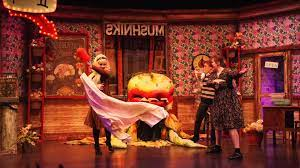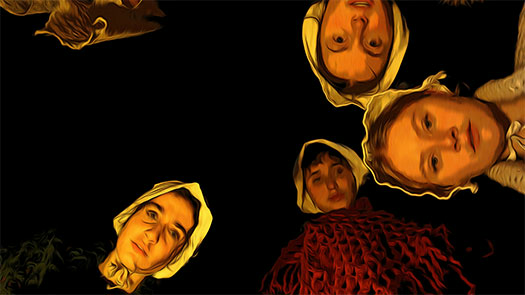Wise Children’s latest production is a funky, musical, and heartrending update of the gory Perrault fairytale. Written and directed by Emma Rice, this performance was at HOME, Manchester.
The production began with a song by some very fearsome nuns in long patchwork robes. They are the Sisters Of The Three F's (the definitions of the initials cannot be given on a family theatre blog like this one!), and they guard vulnerable women. A teenage boy wandered into their space looking for help, and before he got pulverised, the petite yet fearsome Mother Superior stepped in and began to tell him the story of “Blue Beard.”
Several stories were intertwined. “Blue Beard” himself was presented as a successful modern day magician, very fond of doing tricks like throwing knives at beautiful assistants and sawing women from the audience in half with lots of flashing blades. A family of women had just lost the man of their household: beloved husband of Treasure, and much-missed father of Lucky and Trouble. In little black mourning dresses, they go for a night out, see the magic show, and Lucky falls under the influence of Blue Beard’s charm. He proposes marriage. He has a big house with lots of rooms full of beautiful clothes. She accepts. What can go wrong? Then he goes away on a business trip, and leaves her with a big bunch of keys. Just don’t use the key hanging from the silver disco ball…..
In counterpoint, a separate story is played out about the teenage boy’s older sister. She is a tough and independent young woman who always dresses in black, and she’s a gigging musician. One night she’s overstimulated after a performance, and decides to walk home to clear her head. Just don’t walk out of view of the CCTV cameras…..
Weaving her way in and out of everybody else’s dramas was the Mother Superior, like a frenetic soothsayer. Sometimes the jeans she was wearing under her habit got revealed. Just don’t be a loving mother……
The cast were phenomenally talented, and a tight-knit ensemble. Every one of them could play a musical instrument, as well as act, sing, and do the occasional bit of dancing. Patrycja Kujawska was a centrifugal force as the widow Treasure, able to get down and party with her daughters with youthful vigour, then with her violin go into soft melancholy. Stephanie Hockley sparkled as the daughter Trouble, jamming on the piano with a glass of wine in her hand. Robyn Sinclair, as the bride Lucky, really had to hold the story in the twenty first century; and her strong performance, when confronting Blue Beard about the contents of the last room, brought modern day domestic violence and male narcissism into sharp relief.
Mirabelle Gremaud proved ridiculously multi-skilled as the Sister, able to dance en pointe, do back walkovers, sing, play guitar, and bring brittle vulnerability to a resilient exterior. Adam Mirsky, as the Brother, was sweetly plaintive and also played guitar. Tristan Sturrock was suave and magical as Blue Beard: quite believably he could lure lovely women into his lair. And Katy Owen ruled from beginning to end as the Mother Superior: a tightly-coiled elastic energy that never switched off.
Emma Rice’s direction and script featured a lot of stylised group movement, and plenty of noise and naughty humour (the bit about the Kit Kat fingers was classic). Yet in the second half it led up to a series of hard-hitting emotional punches, and a genuine feminist anger that roared at the world. This is not a children’s fairy story. And it’s still happening now.
















